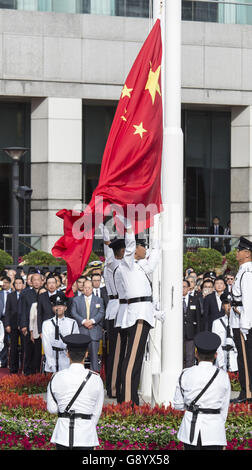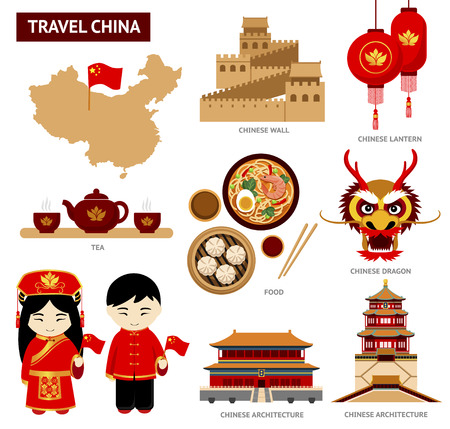
Exploring National Symbols and Fractured Identities in Hong Kong
Photos of national symbols, flag desecration, protests, and cultural identities in Hong Kong.
Mandating Symbolic Patriotism: China’s Flag and Anthem in the Hong Kong Special Administrative Region
My recent adventures as a traveling photographer have taken me to diverse corners of the world, each with its unique stories to tell. One such place that left a deep impression on me is the vibrant cityscape of Hong Kong. Amidst its bustling streets and skyscrapers, I couldn’t help but be captivated by the rich tapestry of its culture and the echoes of its complex history.
However, beneath the surface of this captivating metropolis lies a tale of political struggle and a quest for autonomy. In 2020, a significant development occurred with the passing of a controversial statute in Hong Kong criminalizing any form of disrespect towards the Chinese national anthem. This move, among many others, was seen by many as an attempt to stifle political dissent within the former British colony.
As a fervent believer in freedom of expression, I couldn’t help but feel a sense of concern for the potential curbing of political liberties. The law not only restricts the fundamental right to express one’s political beliefs but also raises questions about its constitutionality. However, previous legal decisions, particularly those upholding laws against flag desecration, have practically assured the statute’s constitutionality.
Drawing upon the realms of sociology and political literature, this article delves into the depths of symbolic nationalism and its ramifications when wielded as a tool by authoritarian states. It argues persuasively that the enforcement of symbolic nationalism through legislation serves as a means to tighten the grip of authoritarianism, suppressing dissent and subverting political freedoms.
Against this backdrop, the article delves into a critical and comparative analysis of Hong Kong’s judicial decisions, which have upheld the suppression of symbolic dissent. Through a meticulous examination of the coherence of these decisions, their normative defensibility, and the far-reaching consequences they entail, the article sheds light on the intricate interplay between law and authoritarian rule.
As I immerse myself in the rich narrative of this article, it becomes evident that the enforcement of patriotic orthodoxy carries significant implications for the rule of law. The efficacy of attempts to enforce unwavering loyalty to the state is called into question, as the natural consequence is the erosion of individual liberties and the stifling of dissenting voices.
With each passing moment, it becomes increasingly clear how the deference to authoritarianism impacts the delicate balance between the rule of law and personal freedoms. It is through the lens of critical observation that this article concludes, leaving us with a profound reflection on the fragility of political freedoms in the face of oppressive regimes.
My travels have not only exposed me to awe-inspiring landscapes and breathtaking wildlife but have also opened my eyes to the complexities of the human experience. As a traveling photographer, it is my duty to capture these stories and shed light on the challenges faced by communities around the world. Through my lens, I hope to inspire dialogue, promote understanding, and contribute to the pursuit of a more just and inclusive society.
Keywords
The Asian Journal of Law and Society, published by Cambridge University Press on behalf of the author(s), in the year 2021, holds the copyright to this work.
Access options
To obtain complete access to the entirety of this content, please utilize one of the available access options provided below. (Logging in will verify if you have institutional or personal access, while content may require purchase if access is unavailable.)
References

In the book “Proportionality in Asia,” edited by Po Jen Yap and published by Cambridge University Press, there is a chapter titled “More Structure, More Deference: Proportionality in Hong Kong,” written by Rehan Abeyratne in 2020. The reference for this chapter is available on CrossRef and can be found through Google Scholar.
The revised edition of Benedict Anderson’s renowned book, “Imagined Communities: Reflections on the Origin and Spread of Nationalism,” was published in 2006 by Verso, a publishing company based in London. This work can be accessed and referenced through Google Scholar.
Eric Barendt’s book, “Freedom of Speech,” in its second edition, was published in 2005 by Oxford University Press, located in New York. To find more information about this publication, you can refer to Google Scholar.
Greetings, fellow adventurers! As I continue to explore the diverse realms of literature and knowledge during my travels, I stumbled upon a fascinating book that delves into the intricate relationship between nationalism and the state. The book in question is none other than “Nationalism and the State,” written by John Breuilly, now in its second edition.
Published in 1993 by the esteemed Manchester University Press, this captivating work invites readers to embark on a thought-provoking journey into the depths of nationalism’s impact on the modern state. With each turn of the page, Breuilly skillfully explores the complex dynamics and historical origins of nationalism, shedding light on its far-reaching consequences.
Within the boundless chapters of this book, Breuilly unveils the fascinating interplay between nationalism and the state, providing valuable insights into the formation, consolidation, and challenges faced by nations throughout history. His meticulous analysis prompts readers to reflect on the intricate tapestry of identity, power, and governance that nationalism weaves within the fabric of society.
For those hungry for knowledge and seeking a deeper understanding of the forces that shape our world, “Nationalism and the State” is a must-read. It offers a comprehensive exploration of this captivating subject, empowering readers to engage critically with the complex interplay between national identity and the structures of the state.
To delve deeper into this intellectual adventure, one can readily access further information about the book through Google Scholar. This invaluable resource opens the doors to an extensive array of academic literature, allowing us to expand our horizons and embark on intellectual journeys of discovery.
As a traveling photographer, I am constantly inspired by the vast range of human experiences and the intricate tapestry of cultures that make up our world. It is through the exploration of thought-provoking works like “Nationalism and the State” that I gain a deeper appreciation for the multifaceted nature of societies and their historical trajectories.
So, fellow adventurers, join me on this captivating expedition into the realm of nationalism and the state. Let us immerse ourselves in the words of John Breuilly, embracing the opportunity to expand our understanding of the forces that shape our world and to foster a more inclusive and empathetic global community.
The speech titled “Speech by Senior Assistant Director of Public Prosecutions,” authored by Andrew Bruce, can be accessed through the link http://www.info.gov.hk/gia/general/200004/28/0427193.htm. This source was retrieved on 9th January 2020 and can also be found on Google Scholar.
Greetings, fellow travelers! As I journey through the vast expanse of information, I stumbled upon an intriguing article that sheds light on the role of the National People’s Congress (NPC) in a significant flag case. The article, titled “NPC Role in Flag Case Floated,” was written by Cliff Buddle and was published in the South China Morning Post on 22nd October 1999.
In this thought-provoking piece, Buddle explores the intricate details surrounding the flag case, delving into the potential involvement of the National People’s Congress. The NPC, as a crucial institution in the political landscape, holds significant sway over important matters within the region.
As I immerse myself in the words penned by Buddle, I can’t help but feel a sense of intrigue and anticipation. The author’s deep understanding and insightful analysis provide a glimpse into the complexities of the flag case and the potential influence of the NPC.
This article serves as a valuable resource, offering a unique perspective on the interplay between legal matters and political institutions. By accessing this piece through Google Scholar, we can delve deeper into the context surrounding the flag case and gain a more comprehensive understanding of its significance.
As a traveling photographer, I find immense inspiration in uncovering the stories that shape the places I visit. The insights provided by articles like “NPC Role in Flag Case Floated” open my eyes to the intricate web of politics, law, and society, enriching my experiences and broadening my perspectives.
Join me on this intellectual journey as we explore the complexities of the flag case and the potential role of the National People’s Congress. Let us engage in critical thinking, fostering a deeper appreciation for the forces that shape our world and embracing the opportunity to become more informed global citizens.
So, fellow wanderers, let us embark on this captivating expedition, immersing ourselves in the words of Cliff Buddle and unraveling the mysteries that lie within the intersection of law and politics. Together, we can expand our horizons, challenge our assumptions, and cultivate a deeper understanding of the world we inhabit.
Greetings, fellow adventurers! As I continue my journey through the vast realms of knowledge, I stumbled upon a thought-provoking article that delves into the complexities of identity and symbolism. The article, titled “Hong Kong Chief Executive Urges People Not to Wave Colonial Flag,” was jointly written by Joshua But and Tony Cheung and was published in the South China Morning Post on 12th June 2018.
In this captivating piece, But and Cheung explore the nuanced dynamics surrounding the waving of the colonial flag in Hong Kong. They highlight the perspective of the Chief Executive, who urges the people to refrain from displaying this symbol of the city’s colonial past.
The article sheds light on the broader issues of identity and historical legacies, as the colonial flag represents a significant chapter in Hong Kong’s history. It prompts us to reflect on the complexities of reconciling a complex past with a rapidly evolving present.
As I delve into the words penned by But and Cheung, I am struck by the layers of meaning encapsulated within the act of waving a flag. Flags serve as powerful symbols that evoke emotions, memories, and sometimes political messages. The discussions raised in this article provoke us to contemplate the intricate interplay between personal expression, historical consciousness, and the shifting dynamics of societal narratives.
By accessing this article through Google Scholar, we can delve deeper into the complexities explored by But and Cheung, gaining a more comprehensive understanding of the Chief Executive’s perspective and the broader societal implications surrounding the waving of the colonial flag.
As a traveling photographer, I find myself captivated by the stories that unfold in the places I visit. The waving of flags, be they national or historical, often serves as a visual testament to the complexities of identity and the layers of history that shape a nation.
Join me on this intellectual voyage as we explore the multifaceted dimensions of identity, symbolism, and historical consciousness in the context of Hong Kong. Let us engage in thoughtful dialogue, fostering a deeper appreciation for the diverse perspectives that contribute to the fabric of society.
So, fellow seekers of knowledge, let us embark on this captivating expedition, immersing ourselves in the words of Joshua But and Tony Cheung, and unraveling the intricate tapestry of identity and symbolism. Together, we can broaden our horizons, challenge our assumptions, and cultivate a deeper understanding of the rich mosaic of cultures that make our world truly remarkable.
Cora Chan authored an article titled “Judicial Deference at Work: Some Reflections on Chan Kin Sum and Kong Yun Ming” in 2010. This article, published in the Hong Kong Law Journal, spans from page 1 to 14. For further details and access to this publication, you can refer to Google Scholar.
Greetings, fellow adventurers! As I delve into the vast sea of knowledge during my travels, I stumbled upon a fascinating article that explores the intricacies of constitutional review within the context of Hong Kong. The article in question, titled “Basic Law and Constitutional Review: The First Decade,” was written by Johannes Chan and was published in the Hong Kong Law Journal in 2007.
In this thought-provoking piece, Chan reflects upon the first decade of constitutional review under the Basic Law. With meticulous analysis and deep insight, the author sheds light on the complexities and challenges faced by Hong Kong’s legal system during this formative period.
As I immerse myself in the words penned by Johannes Chan, I can’t help but be captivated by the significance of constitutional review and its impact on the legal landscape. The article provides valuable insights into the development and evolution of constitutional principles within Hong Kong, offering a comprehensive overview of the legal framework established by the Basic Law.
By accessing this article through Google Scholar, we have the opportunity to delve deeper into Chan’s analysis and gain a more comprehensive understanding of the complexities surrounding constitutional review in Hong Kong. It allows us to engage critically with the challenges and achievements of the first decade, thus expanding our knowledge and fostering meaningful dialogue on the subject.
As a traveling photographer, I am constantly inspired by the diverse stories and experiences that shape the places I visit. The intricacies of legal systems and constitutional frameworks provide a unique lens through which to view and understand a society’s values, aspirations, and challenges.
Join me on this intellectual journey as we explore the world of constitutional review within the context of Hong Kong. Let us embrace the opportunity to broaden our perspectives, challenge our assumptions, and foster a deeper appreciation for the delicate balance between law, governance, and societal dynamics.
So, fellow seekers of knowledge, let us embark on this captivating expedition, immersing ourselves in the words of Johannes Chan, and unraveling the intricacies of constitutional review in the first decade of Hong Kong’s legal journey. Together, we can expand our horizons, engage in meaningful discourse, and contribute to the ongoing conversations surrounding the evolution of legal systems in our ever-changing world.

Greetings, fellow adventurers! As I continue my journey through the vast realm of information, I stumbled upon an intriguing article that delves into the realm of sports and national identity. The article titled “Hong Kong Soccer Fans Jeer National Anthem Despite Tough New Laws” was jointly written by Kin-wa Chan and Shirley Zhao. It was published in the South China Morning Post on 9th November 2017.
In this captivating piece, Chan and Zhao shed light on a recent incident where Hong Kong soccer fans jeered during the national anthem, despite the implementation of new stringent laws aimed at curbing such behavior. The article explores the complex dynamics between sports, national identity, and the freedom of expression.
The authors provide a thought-provoking analysis of this incident, highlighting the tensions that exist within a diverse society like Hong Kong. They raise important questions about the boundaries of national pride and the right to express dissent within the context of sports events.
As I delve into the words penned by Chan and Zhao, I am struck by the intertwining of sports, politics, and culture. The article presents a captivating narrative, offering insights into the multifaceted nature of national identity and the complexities of navigating these sensitivities within the realm of sports fandom.
By accessing this article through Google Scholar, we can further explore the authors’ perspectives and gain a deeper understanding of the sociopolitical context surrounding the incident. It opens the door to a world of scholarly discourse and allows us to engage critically with the complexities of sports, nationalism, and freedom of expression.
As a traveling photographer, I am constantly inspired by the ways in which culture and society intersect. Sports events, with their passionate fans and shared experiences, provide a unique lens through which we can examine the complexities of national identity and the power of collective expression.
Join me on this intellectual voyage as we explore the fascinating world of sports fandom, national identity, and the delicate balance between patriotism and the right to dissent. Let us engage in meaningful dialogue, fostering empathy, and understanding as we navigate the nuanced landscapes of culture and identity.
So, fellow seekers of knowledge, let us embark on this captivating expedition, immersing ourselves in the words of Kin-wa Chan and Shirley Zhao, and unraveling the intricate tapestry of sports, nationalism, and freedom of expression. Together, we can broaden our perspectives, challenge our assumptions, and foster a deeper appreciation for the diverse narratives that shape our world.
Thomas Chan authored an article titled “Diaoyu Islands Activist ‘Proudly’ Jailed for Flag Burning.” This article was published in the South China Morning Post on 14th June 2018. For more details and access to this publication, you can refer to Google Scholar.
Albert H. Y. Chen penned an article titled “Constitutional Adjudication in Post-1997 Hong Kong.” This scholarly piece was published in the Pacific Rim Law & Policy Journal, spanning from page 627 to 82. For further information and access to this publication, you can consult Google Scholar.
Karen Cheung authored an article titled “Civic Passion Lawmaker Cheng Chung-Tai Found Guilty of ‘Desecrating’ Flags during Legislative Session.” This article was published on 29th September 2017 by Hong Kong Free Press. For more information and access to this publication, you can refer to Google Scholar.
Karen Cheung, in her article published on 19th March 2018 by Hong Kong Free Press, highlights a legal scholar’s perspective on the proposed National Anthem Law in Hong Kong. According to the scholar, the proposed law deviates from common law norms. For more details and access to this publication, you can consult Google Scholar.
Greetings, fellow adventurers! As I continue my explorations through the vast realms of knowledge, I stumbled upon an intriguing article that delves into the intricacies of legislative proceedings and controversies. The article titled “Lawmaker Cheng Chung-Tai Keeps His Seat after Legislature Votes on Flag-Flipping Incident” was written by Karen Cheung and published in Hong Kong Free Press on 17th May 2018.
In this captivating piece, Cheung unravels the fascinating story surrounding lawmaker Cheng Chung-Tai and a flag-flipping incident that sparked controversy. The article sheds light on the legislative voting process that ultimately resulted in Cheng Chung-Tai retaining his seat despite the incident.
As I delve into the words penned by Karen Cheung, I am captivated by the intersections of politics, governance, and public opinion. The article offers a glimpse into the delicate balance of power within the legislative sphere and the complex dynamics at play when addressing contentious issues.
Through the lens of this article, we are provided with valuable insights into the inner workings of the legislative process and the mechanisms through which decisions are made. It prompts us to ponder the interplay between individual actions, accountability, and the broader implications for democratic governance.
By accessing this article through Google Scholar, we can further delve into the details of the incident and gain a deeper understanding of the various perspectives surrounding the legislative vote. It offers a platform for scholarly engagement, allowing us to critically analyze the decision-making process and its implications for political representation.
As a traveling photographer, I am constantly inspired by the stories that unfold in the places I visit. The intersection of politics and society provides a rich tapestry of narratives that shape our understanding of governance and its impact on the lives of individuals.
Join me on this intellectual journey as we explore the intricacies of legislative decision-making, political controversies, and the nuances of accountability. Let us engage in meaningful dialogue, fostering a deeper appreciation for the complexities of democratic processes and their significance in shaping the societies we inhabit.
So, fellow seekers of knowledge, let us embark on this captivating expedition, immersing ourselves in the words of Karen Cheung and unraveling the intricate tapestry of legislative dynamics. Together, we can broaden our perspectives, challenge our assumptions, and contribute to the ongoing conversations surrounding the intricacies of governance and representation in our ever-evolving world.
Greetings, fellow adventurers! As I continue my journey through the vast realms of knowledge, I have come across a thought-provoking article that sheds light on the recent developments in Hong Kong. The article titled “Hong Kong’s Made-in-China National Security Law: Upending the Legal Order for the Sake of Law and Order” was authored by Brendan Clift and was published in the Australian Journal of Asian Law.
In this captivating piece, Clift examines the implications of the National Security Law imposed on Hong Kong, tracing its origins and exploring its impact on the legal landscape. The author delves into the complex dynamics surrounding this law, highlighting the tension between maintaining law and order and upholding the principles of a legal system.
As I delve into the words penned by Brendan Clift, I am struck by the significant shifts in the legal order of Hong Kong and the implications they hold for its people. The article provides a comprehensive analysis of the National Security Law, offering insights into its origins, implementation, and consequences for the legal framework that once defined Hong Kong’s unique position.
Through this scholarly work, we gain a deeper understanding of the challenges faced by Hong Kong and the delicate balance between maintaining social stability and protecting individual rights and freedoms. It prompts us to reflect on the wider implications of such measures and their impact on the rule of law and the preservation of democratic values.
By accessing this article through Google Scholar, we can further explore Clift’s analysis and engage in a broader discourse surrounding the legal landscape of Hong Kong. It allows us to critically examine the shifts in power dynamics, the implications for civil liberties, and the long-term effects on the social fabric of this vibrant city.
As a traveling photographer, I am constantly inspired by the stories of resilience and the pursuit of justice. The struggle to maintain a delicate balance between law and order resonates deeply, and I am drawn to the narratives that emerge from the intersection of legal systems and societal norms.
Join me on this intellectual expedition as we delve into the complexities of Hong Kong’s legal landscape, grappling with the implications of the National Security Law. Let us engage in meaningful dialogue, fostering empathy and understanding, as we navigate the intricate tapestry of law, order, and the pursuit of justice.
So, fellow seekers of knowledge, let us embark on this captivating journey, immersing ourselves in the words of Brendan Clift and unraveling the multifaceted implications of Hong Kong’s evolving legal order. Together, we can broaden our perspectives, challenge our assumptions, and contribute to the ongoing conversations surrounding the delicate balance between law, order, and the preservation of fundamental rights and freedoms.
Greetings, fellow adventurers! Today, I stumbled upon a captivating article that delves into the intricate relationship between colonialism, culture, and the law. The article titled “Colonialism, Culture, and the Law: A Foreword” was written by John L. Comaroff and was published in Law & Social Inquiry.
In this thought-provoking piece, Comaroff provides a foreword that sets the stage for an exploration of the complex dynamics between colonialism, culture, and the legal system. The author delves into the profound influence of colonialism on legal frameworks and cultural practices, highlighting the intertwined nature of these domains.
As I delve into the words penned by John L. Comaroff, I am captivated by the profound impact of colonialism on the shaping of laws and the cultural fabric of societies. The article invites us to critically examine the historical legacies of colonialism and the ways in which they continue to shape our understanding of justice, rights, and social norms.
Through this scholarly work, we gain a deeper appreciation for the intricate interplay between legal systems and cultural contexts. It prompts us to question the inherent biases embedded within legal frameworks and to reflect on the ways in which cultural practices can both shape and be shaped by the law.
The article, available through CrossRefGoogle Scholar, serves as a gateway to further exploration and scholarly engagement. It offers an opportunity to delve into the nuanced intersections between colonialism, culture, and the law, and to expand our understanding of the broader implications of these dynamics.
As a traveling photographer, I am constantly inspired by the stories that unfold within different cultures and the diverse ways in which societies navigate the realms of law and justice. The exploration of colonial legacies and their impact on legal systems provides a rich tapestry of narratives that challenge our assumptions and broaden our perspectives.
Join me on this intellectual journey as we delve into the complexities of colonialism, culture, and the law. Let us engage in meaningful dialogue, fostering empathy and understanding, as we navigate the intricate intersections of history, justice, and cultural identity.
So, fellow seekers of knowledge, let us embark on this captivating expedition, immersing ourselves in the words of John L. Comaroff and unraveling the profound connections between colonialism, culture, and the law. Together, we can broaden our perspectives, challenge our assumptions, and contribute to the ongoing conversations surrounding the complexities of justice and cultural heritage in our ever-evolving world.
Costas Douzinas authored an article titled “The Legality of the Image,” which was published in the Modern Law Review. This scholarly work can be found in volume 63, spanning pages 813 to 830. For further details and access to this publication, you can consult CrossRefGoogle Scholar.

Thomas Hylland Eriksen contributed to a publication titled “Some Questions about Flags” in the book “Flag, Nation and Symbolism in Europe and America,” edited by Thomas Hylland Eriksen and Richard Jenkins. This insightful chapter can be found within the pages 1 to 13 of the book published by Routledge. For further exploration and access to this publication, you can refer to CrossRefGoogle Scholar.
“The Moral Limits of the Criminal Law” is a profound work authored by Joel Feinberg, published by Oxford University Press in New York. This book, written in 1984, explores the ethical boundaries and constraints of criminal law. To delve deeper into Feinberg’s insightful analysis, you can refer to Google Scholar for access to this publication.
Brian C. H. Fong authored an article titled “One Country, Two Nationalisms: Center-Periphery Relations between Mainland China and Hong Kong, 1997–2016.” This thought-provoking piece can be found in volume 43 of Modern China, spanning pages 523 to 556. To explore this publication further and gain a deeper understanding of the dynamics between Mainland China and Hong Kong, particularly in the context of center-periphery relations, you can refer to CrossRefGoogle Scholar.
Steve Foster authored an article titled “Human Rights: Flag Desecration, National Insult and Peaceful Protest,” which can be found in the Coventry Law Journal. This enlightening piece, available through Google Scholar, explores the intersections of human rights, flag desecration, and peaceful protest. It is located in the pages 50 to 2 of the journal.
Greetings, fellow adventurers! Today, I stumbled upon an intriguing article that delves into the intersection of freedom of expression, flag burning, and the right to protest in New Zealand. The article titled “Flag Burning, Offensive Behaviour and the Right to Protest in New Zealand” was penned by Andrew Geddis and published in the Public Law Review.
In this thought-provoking piece, Geddis explores the complex legal landscape surrounding flag burning and offensive behavior as forms of protest. He delves into the intricacies of New Zealand’s legal framework, shedding light on the tensions between protecting freedom of expression and addressing potential social harm.
As I delve into the words penned by Andrew Geddis, I am captivated by the delicate balance between the right to protest and the need to regulate behavior in a diverse society. The article prompts us to critically examine the challenges faced by legal systems in reconciling conflicting rights and values.
Through this scholarly work, we gain a deeper understanding of the legal complexities and constitutional considerations surrounding flag burning and offensive behavior. It invites us to reflect on the role of protests as a means to express dissent and challenge societal norms, while also considering the potential impact on public order and cohesion.
By accessing this article through Google Scholar, we can further explore Geddis’s analysis and engage in a broader discourse on the delicate interplay between freedom of expression, protest rights, and the regulation of offensive behavior. It allows us to delve into the legal intricacies of New Zealand’s context and draw comparisons with other jurisdictions.
As a traveling photographer, I am constantly inspired by the power of visual storytelling and the importance of protecting fundamental rights and freedoms. The exploration of flag burning, offensive behavior, and the right to protest in New Zealand presents a fascinating narrative of how societies navigate the boundaries of expression and dissent.
Join me on this intellectual journey as we delve into the complexities of legal frameworks, constitutional considerations, and the fundamental rights at stake. Let us engage in meaningful dialogue, fostering empathy and understanding, as we navigate the intricate intersections of law, protest, and the pursuit of social change.
So, fellow seekers of knowledge, let us embark on this captivating expedition, immersing ourselves in the words of Andrew Geddis and unraveling the multifaceted dimensions of flag burning, offensive behavior, and the right to protest in New Zealand. Together, we can broaden our perspectives, challenge our assumptions, and contribute to the ongoing conversations surrounding freedom of expression and the ever-evolving dynamics of social movements.
Greetings, fellow adventurers! Today, I stumbled upon an insightful book that delves into the captivating realm of national symbols and fractured identities. The book titled “National Symbols, Fractured Identities: Contesting the National Narrative” is edited by Michael E. Geisler and published by the University Press of New England.
As I explore the pages of this thought-provoking book, I am captivated by the preface penned by Michael E. Geisler himself. In these introductory words, Geisler sets the stage for a compelling exploration of national symbols and their role in shaping collective identities.
The preface invites us to critically examine the multifaceted nature of national narratives and the ways in which symbols can both unify and fracture societies. It emphasizes the contested nature of these symbols, highlighting how different groups within a nation may interpret and engage with them in diverse and sometimes conflicting ways.
Through this book, we gain a deeper understanding of the complex dynamics between national symbols, identities, and narratives. It encourages us to question the constructed nature of these symbols and the power dynamics that surround them.
As a traveling photographer, I am constantly inspired by the visual representation of cultures and the stories they tell through their national symbols. The exploration of fractured identities and contestations surrounding these symbols opens up a rich tapestry of narratives and perspectives that challenge our preconceived notions.
By accessing this book through Google Scholar, we can further explore Geisler’s compilation and engage in a broader discourse on the intricate relationship between national symbols and collective identities. It allows us to delve into case studies, diverse perspectives, and critical analyses that contribute to our understanding of the complexities of national narratives.
Join me on this intellectual journey as we navigate the captivating landscape of national symbols, fractured identities, and contestations over the national narrative. Let us engage in meaningful dialogue, fostering empathy and understanding, as we explore the power dynamics, historical contexts, and social implications embedded within these symbols.
So, fellow seekers of knowledge, let us embark on this captivating expedition, immersing ourselves in the pages of “National Symbols, Fractured Identities: Contesting the National Narrative.” Together, we can broaden our perspectives, challenge our assumptions, and contribute to the ongoing conversations surrounding the complexities of collective identities and the diverse ways in which nations shape their narratives through symbols.
Jeffrey Goldsworthy authored an article titled “Kable, Kirk and Judicial Statesmanship,” which can be found in volume 40 of the Monash University Law Review. In this scholarly piece, Goldsworthy delves into the intricate relationship between the cases of Kable and Kirk and the concept of judicial statesmanship. The article spans from page 75 to 114 of the journal and is available for further exploration through Google Scholar.
Benjamin Haas reported in an article titled “Defiant Hong Kong Football Fans Boo China’s National Anthem,” published in The Guardian on 9 November. This captivating piece explores the act of defiance by Hong Kong football fans who expressed their discontent by booing during China’s national anthem. For more information and insights, you can refer to Google Scholar for access to the article.
Benjamin Haas reported in an article titled “Defiant Hong Kong Football Fans Boo China’s National Anthem,” published in The Guardian on 9 November. This captivating piece explores the act of defiance by Hong Kong football fans who expressed their discontent by booing during China’s national anthem. For more information and insights, you can refer to Google Scholar for access to the article.



